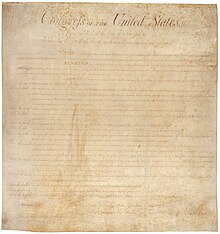Bill of Rights (United States)
| United States Bill of Rights | |
|---|---|

United States Bill of Rights
|
|
| Created | September 25, 1789 |
| Ratified | December 15, 1791 |
| Location | National Archives |
| Author(s) | James Madison |
The Bill of Rights is the first ten amendments to the United States Constitution. Proposed following the often bitter 1787–88 battle over ratification of the U.S. Constitution, and crafted to address the objections raised by Anti-Federalists, the Bill of Rights amendments add to the Constitution specific guarantees of personal freedoms and rights, clear limitations on the government's power in judicial and other proceedings, and explicit declarations that all powers not specifically delegated to Congress by the Constitution are reserved for the states or the people. The concepts codified in these amendments are built upon those found in several earlier documents, including the Virginia Declaration of Rights and the English Bill of Rights, along with earlier documents such as Magna Carta (1215). In practice, the amendments had little impact on judgments by the courts for the first 150 years after ratification.
On June 8, 1789, Representative James Madison introduced nine amendments to the Constitution in the House of Representatives. Among his recommendations Madison proposed opening up the Constitution and inserting specific rights limiting the power of Congress in Article One, Section 9. Seven of these limitations would become part of the ten ratified Bill of Rights amendments. Ultimately, on September 25, 1789, Congress approved twelve articles of amendment to the Constitution, each consisting of one one-sentence paragraph, and submitted them to the states for ratification. Contrary to Madison's original proposal that the articles be incorporated into the main body of the Constitution, they were proposed as supplemental additions (codicils) to it. Articles Three through Twelve were ratified as additions to the Constitution on December 15, 1791, and became Amendments One through Ten of the Constitution. Article Two became part of the Constitution on May 5, 1992, as the Twenty-seventh Amendment.Article One is technically still pending before the states.
...
Wikipedia
